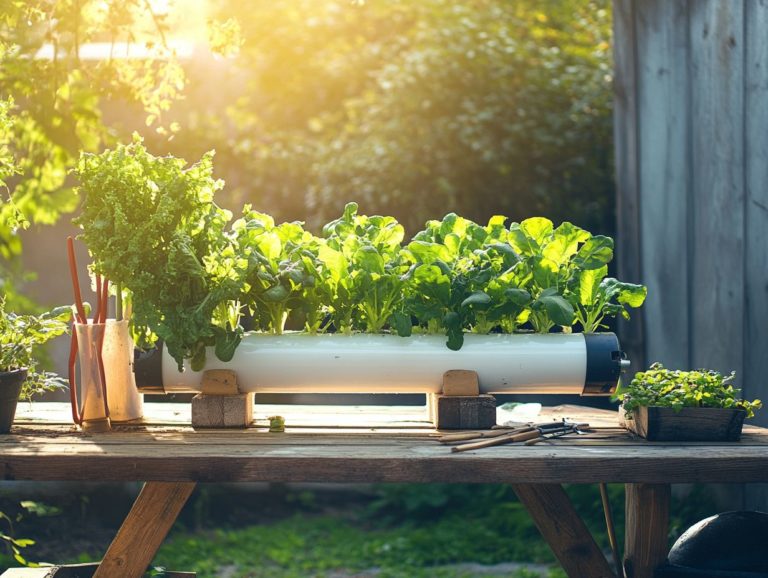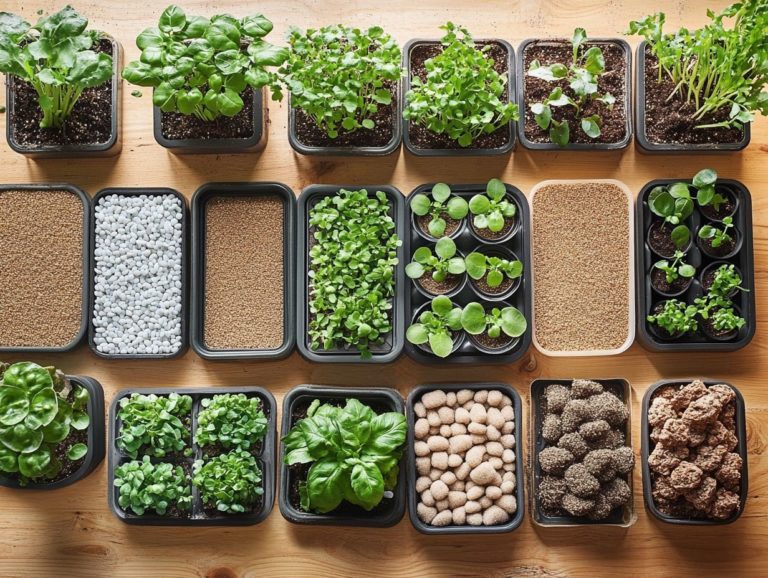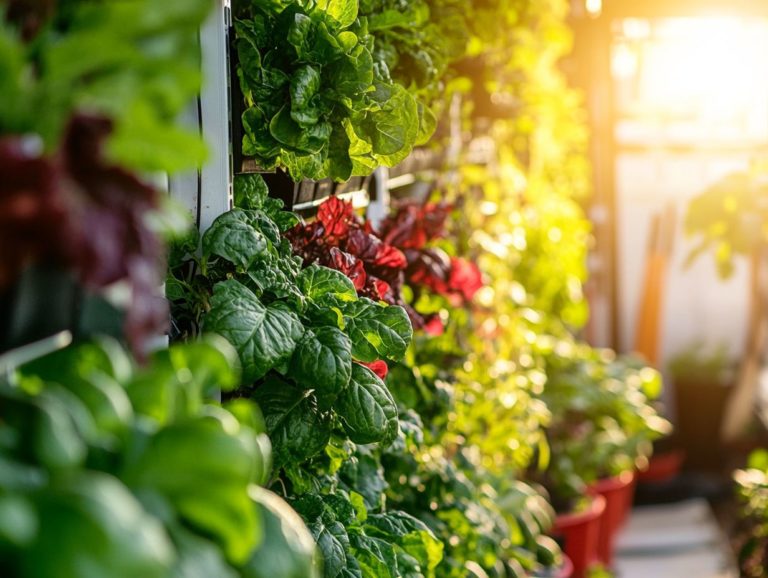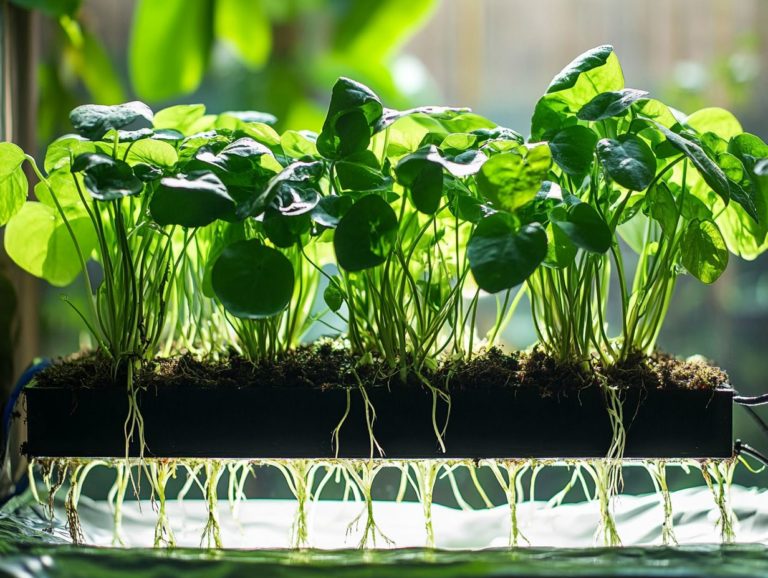How to Fund a Hydroponic Gardening Project?
Considering a venture into hydroponic gardening? You’re in good company! This cutting-edge approach to cultivating plants without soil presents a wealth of advantages, from enhanced yields to optimal space utilization.
Before embarking on this journey, it s crucial to grasp the financial aspects of your hydroponic project.
This article delves into various funding avenues, including grants, loans, and crowdfunding. It also offers vital budgeting insights and strategies to help you secure the financial backing you need.
Whether you’re an experienced gardener or just starting out, get ready to dive into hydroponic gardening and unlock the secrets to success!
Contents
- Key Takeaways:
- What is Hydroponic Gardening?
- Benefits of Hydroponic Gardening
- Funding Options for Hydroponic Gardening
- Creating a Budget for Your Project
- Tips for Securing Funding
- Frequently Asked Questions
- 1. How can I secure funding for a hydroponic gardening project?
- 2. Is it possible to fund a hydroponic gardening project without any prior experience?
- 3. Can I use a personal loan to fund my hydroponic gardening project?
- 4. How can I convince investors to fund my hydroponic gardening project?
- 5. Are there specific grants available for hydroponic gardening projects?
- 6. Can I use a combination of funding sources for my hydroponic gardening project?
Key Takeaways:

- Hydroponic gardening has numerous benefits, including year-round production, higher yields, and reduced water usage compared to traditional gardening methods.
- There are various funding options available for hydroponic gardening projects, such as grants, loans, crowdfunding, and investors.
- When creating a budget, consider costs such as equipment, supplies, labor, and marketing. To secure funding, prepare a solid business plan, network, and market your project effectively.
What is Hydroponic Gardening?
Hydroponic gardening is an innovative agricultural method that allows you to grow plants without soil, using water with essential nutrients instead. This approach is especially beneficial in urban environments where traditional farming can be a challenge.
Not only does it maximize your available space, but it also integrates green farming practices. This significantly contributes to the fight against food insecurity by providing fresh produce in local grocery stores and community initiatives.
Hydroponic systems operate on the principle of delivering essential nutrients directly to plant roots. This enables faster growth and higher yields compared to conventional methods.
By embracing vertical farming techniques, you can optimize your limited space, stacking layers to produce more crops per square foot. This method conserves water and energy while also reducing the carbon footprint associated with transportation, enhancing the local food system.
As communities adopt these sustainable practices, they often see improvements in overall health. This provides access to fresh, nutritious food and fosters resilience, encouraging a healthier lifestyle for everyone involved.
Benefits of Hydroponic Gardening
The advantages of hydroponic gardening are vast, offering everything from enhanced crop yields to significant reductions in water consumption. This method is emerging as a vital element in the future of sustainable agriculture.
By embracing this innovative approach, urban environments can cultivate fresh produce year-round, positively influencing local grocery stores and addressing the food deserts that contribute to food insecurity.
Advantages over Traditional Gardening
Hydroponic gardening offers numerous advantages over traditional gardening, especially regarding resource efficiency and maximizing yield. By utilizing controlled environments, you can significantly reduce water usage while enhancing crop output.
This method stands out as a practical solution for urban agriculture, particularly in tackling food insecurity in densely populated areas. It enables you to cultivate a diverse range of plants in compact spaces, making it perfect for those residing in apartments or cities where land is scarce.
Unlike conventional gardening, which often battles pests and diseases, hydroponic systems use nutrient-rich solutions in a sterile setting. This greatly minimizes the risk of infestations.
With precise nutrient management, you can tailor nutrient delivery to meet the specific needs of your plants. This results in healthier growth and increased yields.
This unique combination not only optimizes growth but also fosters sustainability in agricultural practices, allowing you to garden in harmony with the environment.
Funding Options for Hydroponic Gardening
Exploring funding options for hydroponic gardening is essential for individuals and organizations seeking to adopt this eco-friendly farming. The initial investment in technology and infrastructure can be significant, making it vital to understand the available financial resources.
You have a variety of funding sources at your disposal, including:
- Government programs such as ESSER III funding
- Grants from organizations like the USDA and Environmental Working Group
- Private investors eager to support innovative ventures
Grants and Loans

Grants and loans are essential funding avenues for anyone interested in hydroponic gardening. They provide the financial backing needed to turn visionary ideas into reality.
Programs from the USDA Farm Service Agency and Urban Agriculture Grants specifically target urban farmers committed to sustainable practices, ultimately bolstering food security within local communities.
As an aspiring hydroponic gardener, consider the Specialty Crop Block Grant Program, which champions innovative agricultural methods, or the Sustainable Agriculture Research and Education (SARE) program, designed to elevate farming practices through dedicated research and education.
Both programs have distinct eligibility criteria. You must demonstrate potential for economic viability and environmental sustainability. The application processes can vary significantly, often demanding detailed project proposals and comprehensive financial plans. Thorough preparation is crucial for successfully securing funding.
By tapping into these financial opportunities, you can enhance your ventures and contribute to advancing the broader agricultural landscape.
Crowdfunding
Crowdfunding has become a prominent funding avenue for hydroponic gardening projects. It allows you to tap into community support and foster local engagement. This approach enables you to present your innovative agricultural ideas and secure financial backing from enthusiastic supporters, contributing to food security and green farming initiatives.
With platforms like Kickstarter, GoFundMe, and Indiegogo, you can effectively showcase your projects and reach a broader audience. Successful campaigns often emphasize unique features, such as sustainable practices and community benefits, inspiring others to get involved.
This collaborative funding model provides essential capital and cultivates a dedicated community. Participants are encouraged to share their experiences and knowledge, enriching the entire endeavor.
By harnessing the collective effort of your supporters, your hydroponic gardening ventures can flourish. This commitment makes significant contributions to a greener future and bolsters local food systems.
Investors
Attracting investors is crucial for scaling your hydroponic gardening operations. They provide the essential capital needed to implement advanced technologies and expand production. Today s investors are increasingly drawn to sustainable agricultural practices, recognizing the potential for profitability and positive social impact through innovative solutions that tackle food insecurity.
To engage this audience effectively, articulate a clear business model that outlines the financial benefits and reduced operational costs associated with hydroponic farming compared to traditional methods. A well-structured pitch highlighting market demand, projected returns, and sustainability will capture potential backers’ imaginations.
Showcase successful case studies and highlight technological advancements to bolster your credibility. Networking at industry events and leveraging online platforms can significantly enhance your visibility, making it easier to connect with like-minded investors eager to support transformative agricultural solutions.
Start exploring these funding options today to make your hydroponic garden a reality!
Creating a Budget for Your Project
Creating a comprehensive budget for your hydroponic gardening project is essential for successful financial planning and smart use of resources. This process requires you to estimate initial capital expenses, ongoing operational costs, and potential revenue.
By doing so, you can align your project goals with available funding sources, paving the way for long-term sustainability.
Costs to Consider
When you re budgeting for a hydroponic gardening project, there are several costs to keep in mind. These include infrastructure setup, equipment purchases, and ongoing maintenance.
Understanding these expenses gives you a clearer picture of the financial commitment involved and better prepares you for securing the necessary funding.
For example, the initial setup of a hydroponic system can vary widely based on its size and complexity. You might be looking at a range from a few hundred dollars for simple systems to thousands for more advanced setups.
Don t forget about your choice of nutrient solutions, which are crucial for plant growth and contribute to your recurring expenses. Labor costs for regular maintenance, monitoring, and harvesting affect your overall budget.
It’s essential to factor in electricity costs for lighting and climate control, along with any potential water usage fees. This creates a comprehensive financial plan that sets your hydroponic venture up for success.
Tips for Securing Funding

Securing funding for your hydroponic gardening initiative demands a blend of strategic planning, effective communication, and a robust business plan that clearly illustrates the project s viability and potential impact.
By adopting thoughtful strategies like networking and building relationships within the agricultural community, you can significantly increase your chances of securing the financial backing you need. Get ready to thrive!
Preparing a Solid Business Plan
A solid business plan is crucial for securing funding for your hydroponic gardening project. It outlines your goals, strategies, and financial projections.
This document isn t just essential for attracting investors; it serves as a roadmap to guide your project toward success.
At the heart of an effective plan is a comprehensive market analysis that identifies your target demographics and assesses the competitive landscape. This ensures you are well-positioned strategically.
Financial forecasts play a pivotal role as well. They provide potential investors with clear projections that highlight expected returns and cash flow timelines.
You must also articulate how you will run things, detailing everything from supply chain logistics to staffing needs. This preparation demonstrates your readiness and scalability.
All these components illustrate the feasibility of your venture and help build the trust necessary to secure crucial investment capital.
Networking and Building Relationships
Networking and building relationships within the agricultural and hydroponic gardening communities can significantly elevate your chances of securing funding and support for your projects.
Engaging with local organizations and resources, such as FarmRaise consultations and community programs, creates invaluable pathways for collaboration and shared knowledge.
These connections provide not only valuable insights but also the potential for partnerships that can strengthen your proposal. Attending workshops, participating in community events, and connecting through social media platforms like LinkedIn will help you cultivate these essential relationships.
By expressing your willingness to offer support in return, you foster a sense of community that enhances long-term bonds, crucial in your funding efforts. Remember, successful funding transcends the project itself; it s about the network of individuals and organizations rallying behind you, championing your vision and objectives.
Marketing Your Project
Effective marketing of your hydroponic gardening project is vital for attracting investors, customers, and community support. Use a variety of strategies, like social media outreach and local events, to showcase your project’s benefits.
Highlight innovative aspects of hydroponics, such as water conservation, pesticide reduction, and year-round crop production. This fosters interest and engagement while positioning your project as a leader in sustainable practices.
Form local partnerships with schools, restaurants, and farmers’ markets to create excitement and community ownership. Regular workshops and open days allow participants to experience hydroponic systems firsthand, boosting support and paving the way for project success.
Frequently Asked Questions
1. How can I secure funding for a hydroponic gardening project?

Funding options for a hydroponic gardening project include crowdfunding, grants, loans, and personal investments. Local or government programs may also support sustainable agriculture initiatives.
2. Is it possible to fund a hydroponic gardening project without any prior experience?
Yes, you can secure funding even without prior experience. However, doing some research about hydroponic gardening can increase your chances of success.
3. Can I use a personal loan to fund my hydroponic gardening project?
A personal loan can be used for funding. Make sure to carefully consider the loan’s terms and interest rates before deciding.
4. How can I convince investors to fund my hydroponic gardening project?
Show investors the benefits, such as increased efficiency and higher yields. A detailed business plan and market analysis will help demonstrate potential returns.
5. Are there specific grants available for hydroponic gardening projects?
Yes, grants for sustainable agriculture and food production may include hydroponic gardening. Research these options to boost your funding chances.
6. Can I use a combination of funding sources for my hydroponic gardening project?
You can combine various funding sources, including personal investments, grants, loans, and crowdfunding. Just ensure you understand the terms of each source before deciding.






